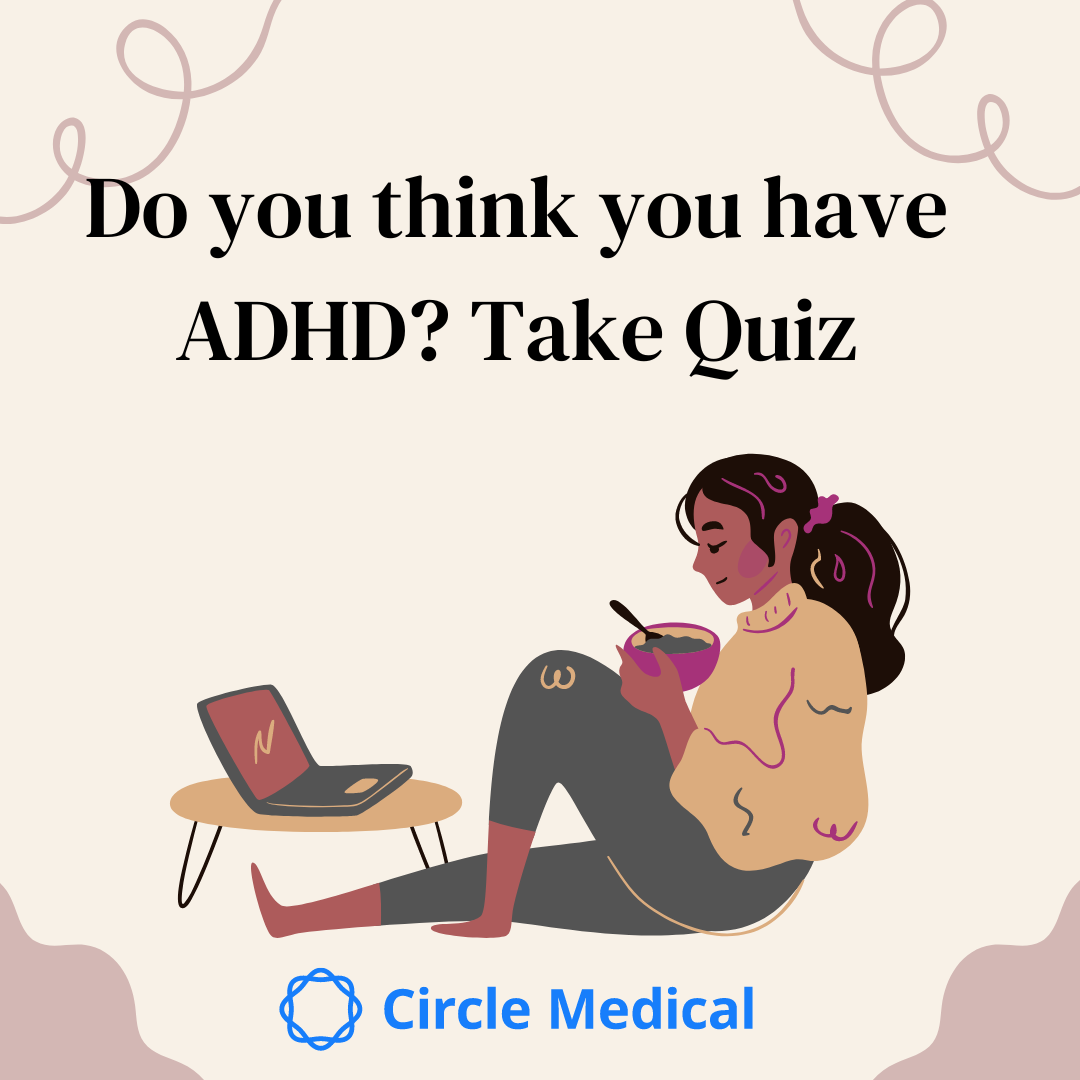Concerta is methylphenidate formulated as an extended-release tablet used to treat ADHD in patients from 6 to 65 years old. Some common side effects can include trouble sleeping, headache, lack of appetite, and increased heart rate. The majority of adverse side effects experienced by those taking Concerta are mild to moderate. However, there is a risk of more severe side effects that should be discussed with your prescriber.
What Is Concerta?
Concerta is a medication FDA-approved to treat ADHD in children aged 6 and older and adults up to 65 years old. Concerta is an extended-release tablet containing methylphenidate. It is formulated as a replacement for taking immediate-release methylphenidate two to three times each day. It can help reduce the ups and downs that come with having to take multiple doses each day.1
Concerta works in the central nervous system (CNS) to increase the amount of active norepinephrine and dopamine. Studies have shown that this helps to reduce symptoms of ADHD and improve the quality of life for those with ADHD. Sometimes a doctor will use Concerta for a condition that is not FDA-approved, such as narcolepsy. Treatment of narcolepsy with Concerta has not been approved by the FDA, and your prescriber should review the risks or treatment and reasoning for treatment with Concerta.1, 2
See If You Have ADHD - Same Day Appointments Affordable and accessible ADHD evaluations and treatment, including possible controlled substances medication if clinically appropriate. Diagnosis and prescription over video. Insurance accepted. Same day appointments.
Common Side Effects of Concerta
Common side effects when taking Concerta are reported by more than 1% of those that participated in trials. These side effects can range from sleep disturbances to changes in appetite. Since you may experience one or more of these, you should discuss with your doctor a plan to mitigate them. Most of these side effects will not require immediate medical attention.
Common side effects of Concerta include:
- Rapid heartbeat
- Dry mouth
- Nausea
- Irritability
- Decreased appetite
- Headache
- Depression
- Trouble sleeping
- Anxiety
- Excessive sweating
Mild Side Effects of Concerta
Side effects of Concerta can range from mild to severe. Most mild side effects are limited in how long they last or only create mild discomforts or inconveniences. Some side effects like headache and nervousness may go away after your body has become accustomed to the medication. Other side effects like trouble sleeping and increased heart rate may last as long as you’re taking the medication. If mild side effects do not go away or become too burdensome, you should discuss with your doctor the options you may have.1
Mild side effects of Concerta include:
- Dizziness
- Nausea
- Irritability
- Headache
- Trouble sleeping
- Restlessness
- Decreased appetite
Serious Side Effects of Concerta
Concerta can cause serious side effects that require immediate medical attention. The risk of these serious side effects should be discussed thoroughly before taking Concerta. Lack of treatment, when a severe reaction happens could cause severe damage to your health.
Serious side effects of Concerta include:
- Large changes in blood pressure or heart rate
- Arrhythmias
- Manic symptoms
- Aggression
- Seizures
- Tics or involuntary muscle movements
- Peripheral neuropathy
- Changes in vision
- Priapism (long-lasting erection)
Long-term Side Effects of Concerta
Taking Concerta for long periods of time, usually longer than 6 months, can expose patients to specific long-term risks. If you and your doctor decide taking Concerta long-term is the best treatment for you, you should discuss additional risks and precautions that must be taken. Expect to have regular checkups that include blood tests, vision tests, heart tests, and others.1
Long-term side effects of Concerta include:
- Leukopenia (reduced circulation of white blood cells)
- Vision changes
- Growth suppression
- Hematologic (blood) changes
- Raynaud’s Syndrome (numbness and feeling cold)
- Dependence
Online Psychiatry Circle Medical – ADHD Diagnosis and Treatment Affordable and accessible ADHD evaluations and treatment, including possible controlled substances medication if clinically appropriate. Diagnosis and prescription over video. Insurance accepted. Same & next day appointments available. Visit Circle Medical Plushcare There are many effective medications for ADHD, including Strattera, which a Plushcare doctor can prescribe. In as little as 15 minutes, you can speak with a board-certified doctor from PlushCare to receive ADHD treatment. Plushcare DOES NOT prescribe controlled substances. Visit Plushcare
How to Manage Side Effects
It is important to have a plan on how to manage side effects while taking Concerta. Effectively managing certain side effects can increase treatment adherence and improve overall ADHD symptom management. Your doctor can provide safe effect tips to manage certain mild side effects if they occur. You should always be aware of at what point professional medical attention is required.
Anxiety
All forms of methylphenidate and all stimulant medications can cause mild to severe anxiety. If you have previously experienced anxiety symptoms, Concerta might not be a good treatment option for you. It is important to let your therapist know you have been prescribed Concerta. They can help you identify coping mechanisms that help to reduce anxiety.
Having a daily routine and sticking to that schedule is helpful for anxiety reduction. It may also be helpful to practice breathing techniques and meditation. In some cases, your doctor may prescribe an anti-anxiety medication. However, since many anxiety medications may not be safe to take with Concerta, only take it exactly as your doctor has prescribed it.1
Depression
Concerta can cause feelings of depression. It is important to let your therapist know you have been prescribed Concerta. They can help you identify coping mechanisms that help to reduce feelings of depression. Some tactics may be engaging in exercise, planning fun activities with friends, and attending talk therapy. In some cases, your doctor may decide that taking an antidepressant may be beneficial.
Anger
Taking Concerta can cause symptoms of anger. This can be shown as agitation, aggression, nervousness, and restlessness. In rare cases, this can cause severe manic episodes. It is important to discuss with your doctor any previous diagnosis of bipolar disorder or manic episodes.
Side effects of anger can be mitigated with calming techniques, talk therapy, and medication used to calm your mood. Work with your doctor to determine when this side effect may become too severe to continue treatment.
Weight Loss
Concerta is known to decrease appetite, cause nausea, and in some cases, abdominal pain and vomiting. All of these factors contribute to Concerta, causing weight loss over time. It is important to discuss your healthy weight with your doctor and ensure you take action if you fall below that weight.
Sticking to a meal plan can be helpful to ensure you consume the proper amount of calories daily. It may also be a good idea to stick to foods that you enjoy, so eating is not so much of a burden. You may also want to plan your larger meal times when Concerta is not as active in your body. This would include first thing in the morning and later in the evening.
Side effects from taking Concerta will be different for everyone and your management plan will be different as well. Consistent communication with your care team is crucial to keeping you safe and comfortable. Make sure you understand what side effects you may experience and how to deal with them if they arise.
Find A Psychiatrist Grow Therapy enables you to find a psychiatrist who can diagnose your condition, prescribe appropriate medication, and monitor your reaction to medication. Learn More
What Are the Side Effects of Concerta in Children Vs. Adults?
The side effects of Concerta can vary between children and adults. It is important to understand which side effects will apply to you or your child. Studies have shown specific additional side effects that are more likely to occur in children. Major differences in side effects include tics, infections, and changes in growth.1, 3
Concerta side effects reported in children but not adults include:
- Abdominal upper pain
- Fever
- Nasal inflammation
- Cough
- Tics
- Growth suppression
Allergic Reactions
Allergic reactions can be severe and deadly if untreated. It is important to seek help right away if there is an allergic reaction suspected. It is important not to take Concerta if you are allergic to methylphenidate in any form. Methylphenidate comes as many differently named medications, so it is crucial to identify all allergies you have, if any, with your prescribing doctor.1
Allergic reactions to Concerta include:
- Swelling of the face
- Rash or hives
- Itchiness of the body or throat
- Trouble talking or breathing
- Fainting
If you experience any of these symptoms, call 911 and seek medical help right away. After treatment, you must check in with your doctor before starting ADHD treatment again. Do not continue taking Concerta. You may try another stimulant medication at your doctor’s direction but should stay away from any other products containing methylphenidate.
Concerta Warnings & Precautions
Before starting treatment with Concerta there are many warnings and precautions you should be aware of. Understanding these warnings can help you safely take Concerta. If any of these precautions apply to you, Concerta may not be the best treatment for your ADHD.1
Precautions for taking Concerta include:
- Potential for misuse and addiction: Concerta is a stimulant that can cause dependence and create problems for those with a history of drug dependence or alcoholism. Withdrawal from the use of Concerta should be supervised to help manage symptoms that develop.
- Interactions with monoamine oxidase inhibitor (MAOIs) antidepressants: MAOIs are a specific kind of antidepressant that can dangerously interact with Concerta if taken at the same time. At least 2 weeks should pass after stopping an MAOI before Concerta is started.
- Worsening glaucoma: Concerta can cause visual disturbances and blurred vision. Those with a history of glaucoma should not take Concerta.
- Tics: Taking Concerta can cause muscle movements and tics. Those with a history or familial history of tics or Tourette’s syndrome should not take Concerta.
- Agitation: Taking Concerta can cause anxiety, tension, and agitation. Anyone with a marked history of any of these should not take Concerta, as these symptoms could be worse than normal.
- Serious cardiovascular events: Concerta causes increased heart rate and increased blood pressure. Those that have a history of heart disease, stroke, arrhythmias, or cardiac abnormalities can suffer severe cardiovascular events while taking Concerta.
- Seizures: Concerta has been linked with seizure threshold in some patients. Those with a history of seizures should not take Concerta, and Concerta should be stopped if a seizure does happen.
Who Experiences the Most Side Effects on Concerta?
Some people may be more likely to experience side effects than others. Those with preexisting conditions related to common side effects from Concerta usually are at a higher risk of experiencing side effects. Examples include high blood pressure, anxiety, and tics. In addition, sleeping disorders, depression, and gi issues can put you at a higher risk of certain side effects.
Before taking Concerta, have a conversation about your full health history with your doctor to identify factors that would increase your likeliness of experiencing side effects. Finally, many side effects increase in severity as the dose of Concerta increases. Be sure to follow your doctor’s orders exactly, not increasing or decreasing your dose without their direction. 1
ADHD Management Tools Inflow App is the #1 science-based app to help you manage your ADHD. Their support system helps you understand your neurodiverse brain and build lifelong skills. Free Trial
Concerta Frequently Asked Questions (FAQ) About Side Effects
Taking Concerta can come with many questions. Your doctor or pharmacist should be able to answer all of your most detailed questions. The following are a few important and frequently asked questions about Concerta’s side effects.1
How Long Do Concerta Side Effects Tend to Last?
Most common side effects are temporary and last only a few weeks when first starting the medication. This is the time when your body is adjusting to the medication. Side effects can reappear if you change your dose, so be aware. There are, however, some side effects that increase in likelihood the longer you take Concerta.2
Do Concerta Side Effects Vary Based on the Dosage?
Most side effects of Concerta will increase in severity and/or likelihood as the dose taken increases. This is why it is very important to slowly increase your dose over time according to your doctor’s directions. If you are switching from immediate-release methylphenidate to Concerta, your doctor will take into account your current dose to avoid any dose-related side effects.1
Can Concerta be Taken With Other Medications?
Concerta can be taken with other medications but there are certain medications that should be avoided due to their interaction with Concerta. Some of the main medications to avoid are antidepressants like MAOIs, seizure medications, blood pressure medications, other stimulants, decongestant medications, and blood thinners.
Always check with your doctor and pharmacist before taking any new medications while taking Concerta. You should always have a complete list of all of your current medications.1
What is Priapism, and What Should I Do if it Occurs?
Priapism is a painful and prolonged erection, and it has been reported in adult and adolescent patients taking methylphenidate. If not treated immediately, there is a potential for lasting damage. It is important to seek medical help immediately if this occurs.1
Concerta Withdrawal Side Effects
Concerta, along with other stimulants, is a medication that can cause dependence. It is important to be aware that withdrawal side effects can happen if Concerta is stopped abruptly. If you would like to stop taking Concerta, consult your doctor. They will provide a gradual plan to decrease the medication slowly to reduce the risk of withdrawal symptoms.
Withdrawal symptoms can include agitation, anxiety, sweating, fevers, and rebound depression. It is important to identify these symptoms and seek medical help right away. This may include supportive care or restarting Concerta until symptoms resolve.1
Alternatives to Adderall Available Online Learn which ADHD medications can help you. There are many effective medications for ADHD including Strattera and Clonidine, which a Plushcare doctor can prescribe. In as little as 15 minutes, you can speak with a board-certified doctor from PlushCare to receive ADHD treatment. Plushcare DOES NOT prescribe controlled substances, including Adderall.
Other Warnings & Precautions For Taking Concerta
Some additional important precautions are needed when taking Concerta. These warnings exist because there have been documented cases of specific serious events. Understanding these risks can help you stay safe while taking Concerta.1
Precautions for taking Concerta include:
Increased Risk of Seizures
Concerta and other stimulants may lower the threshold for seizures in some patients. This risk is especially significant in those with a history of seizures. Concerta should not be used in patients with seizures, either past or current.
Worsened Mental Health Conditions
Concerta can cause symptoms of agitation and mania in those with undiagnosed bipolar disorder symptoms. It is important to screen for bipolar disorder before treatment with Concerta. If symptoms of mania or aggression occur while taking Concerta, you should seek medical treatment and discontinue Concerta.
Serious Cardiovascular Events
Concerta and other stimulants increase blood pressure and heart rate. There have been documented cases of serious cardiovascular events resulting in death in those taking Concerta. It is important not to take Concerta if you have a history of cardiovascular disease or current untreated high blood pressure.
Long-term Growth Suppression
Studies have shown that Concerta can slow growth in children consistently taking the medication. It is important to monitor height and weight throughout treatment. Depending on the growth rate, treatment may need to be intermittently stopped. This should only happen at the direction of a doctor.1
Visual disturbances
Concerta and other stimulants have been shown to cause blurring of vision and other vision changes. If you have a history of glaucoma you should not take Concerta. In addition, you should have regular eye exams while taking Concerta. If your vision changes at all during treatment, you should let your doctor know right away.1
Questions to Ask Your Healthcare Provider About Concerta Side Effects
When deciding if Concerta may be a good treatment for you, a conversation with your doctor, psychiatrist, or therapist is the best place to start. They can help you decide if it is a safe treatment and if you would benefit. Also, remember that online psychiatry services may be a good option if you need them. This can be beneficial for people that live in rural areas or if their current provider is not a good fit. Just make sure to ask about controlled substance prescribing laws, as Concerta is a controlled substance.
Questions to ask your care team about Concerta side effects include:
- How long will it take for me to adjust to taking Concerta?
- Am I at risk for more severe side effects if I am already taking medication for anxiety, depression, or other mental health conditions?
- Will a previous history of addiction make me more susceptible to dependency?
- What is the best dosage to ensure fewer side effects?
- Are there drugs I am taking that could have negative interactions?
- When should I reach out to you if I am experiencing side effects?
- What if I can’t sleep while taking Concerta?
- I have trouble swallowing pills, can I cut the Concerta tablet?
- How should I monitor my blood pressure while taking Concerta?
- What if I want to stop taking Concerta?
- Can I drink alcohol while taking Concerta?
- Is there anything I should tell my therapist about this new medication?
- Are there discounts, savings cards, or coupons for Concerta available?
- How does Concerta compare to Focalin and other ADHD medications?
In My Experience
Concerta can be an effective treatment for those with ADHD. It is important to understand the risks that come with taking Concerta. If any warnings or precautions apply to you, Concerta is probably not the best ADHD treatment for you. Communicating regularly with your doctor is an important part of safe treatment with Concerta.
To help our readers take the next step in their mental health journey, Choosing Therapy has partnered with leaders in mental health and wellness. Choosing Therapy is compensated for marketing by the companies included below. Online Psychiatry Circle Medical – ADHD Diagnosis and Treatment. Affordable and accessible ADHD evaluations and treatment, including possible controlled substances medication if clinically appropriate. Diagnosis and prescription over video. Insurance accepted. Same & next day appointments available. Visit Circle Medical Plushcare There are many effective medications for ADHD, including Strattera, which a Plushcare doctor can prescribe. In as little as 15 minutes, you can speak with a board-certified doctor from PlushCare to receive ADHD treatment. Plushcare DOES NOT prescribe controlled substances. Visit Plushcare Online Therapy BetterHelp Get support and guidance from a licensed therapist. BetterHelp has over 20,000 therapists, who provide convenient and affordable online therapy. Complete a brief questionnaire and get matched with the right therapist for you. Get Started ADHD Management Tools Inflow App Inflow is the #1 science-based app to help you manage your ADHD. Their support system helps you understand your neurodiverse brain, and build lifelong skills. Free Trial Free Prescription Discount Card Optum Perks Save up to 80% on most prescriptions. Optum Perks provides discounts at over 64,000 pharmacies nationwide. No memberships or costs to you, ever. It’s really that easy. Get your card and start saving. Get the discount card! Free ADHD Newsletter A free newsletter from Choosing Therapy for those impacted by ADHD. Get helpful tips and the latest information. Sign Up Choosing Therapy Directory You can search for therapists by specialty, experience, insurance or price, and location. Find a therapist today.Additional Resources
Do you think you have ADHD? Answer an evidence-based questionnaire for Circles Medical to learn more. Takes 45 seconds.
Best Online Psychiatry Services Online psychiatry, sometimes called telepsychiatry, platforms offer medication management by phone, video, or secure messaging for a variety of mental health conditions. In some cases, online psychiatry may be more affordable than seeing an in-person provider. Mental health treatment has expanded to include many online psychiatry and therapy services. With so many choices, it can feel overwhelming to find the one that is right for you.







